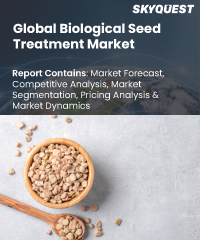
Report ID: SQMIG15C2042

Report ID:
SQMIG15C2042 |
Region:
Global |
Published Date: September, 2024
Pages:
184
|
Tables:
59 |
Figures:
75
Biological Seed Treatment Market size was valued at USD 1.21 Billion in 2023 and is poised to grow from USD 1.33 Billion in 2024 to USD 2.88 Billion by 2032, growing at a CAGR of 10.1% during the forecast period (2025-2032).
The global market for biological seed treatment is poised for substantial growth in the foreseeable future, primarily driven by the escalating demand for chemical-free crops. This surge in demand is attributed to shifting consumer preferences towards personal health improvement and the consumption of wholesome food. Additionally, the increasing elderly population is anticipated to further stimulate the demand for biological seed treatment. Notably, corn stands out as the primary crop benefiting from biological seed treatment applications in the United States. American farmers have recognized that employing selected biological seed treatment methods provides corn with a significant advantage during the germination period, leading to improved yields and contributing to sustainability in agriculture. By implementing precise combinations of microbial and fungal agents in biological seed treatments for corn, farmers have witnessed remarkable yield growth of up to ten percent.
The adoption of biological seed treatment in agricultural practices has witnessed significant growth due to its ability to prevent seed-borne and soil-borne infections and diseases. Compared to chemical treatments, biological seed treatment poses a lower risk of exceeding residue limits, aligning with the increasing demand for sustainable agriculture. Furthermore, the rising trend of organic farming is expected to have a direct impact on the market penetration of biological seed treatment products. According to the Office for National Statistics in the United Kingdom, the agriculture sector contributes approximately 0.7% to the country's total GDP. The composition of biological seed treatment products, consisting of naturally occurring active ingredients, offers plant protection against abiotic stress and soil-borne pathogens, consequently enhancing overall plant growth. However, the lack of awareness regarding sustainable agricultural practices in developing economies is projected to hinder market growth. Additionally, limited shelf life, particularly for seeds like soybean compared to other treated crop seeds, is expected to negatively impact demand over the forecast period. Biological seed treatment plays a crucial role in achieving sustainable agriculture by reducing the reliance on chemical fertilizers, boosting immunity, enhancing nutrient absorption capacity, and improving resistance to diseases and pest attacks. The reduced use of chemical fertilizers not only enhances crop health but also enables quick recovery from abiotic stressors such as drought and salinity.
Our industry expert will work with you to provide you with customized data in a short amount of time.
REQUEST FREE CUSTOMIZATIONWant to customize this report? This report can be personalized according to your needs. Our analysts and industry experts will work directly with you to understand your requirements and provide you with customized data in a short amount of time. We offer $1000 worth of FREE customization at the time of purchase.

Report ID: SQMIG15C2042